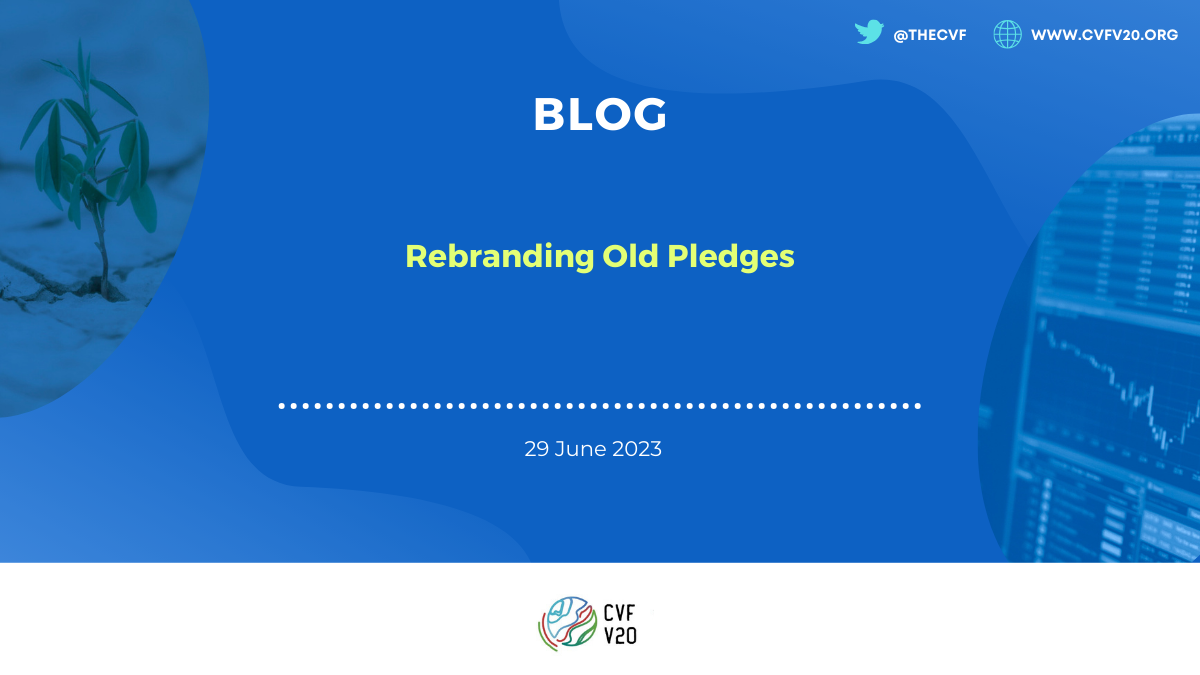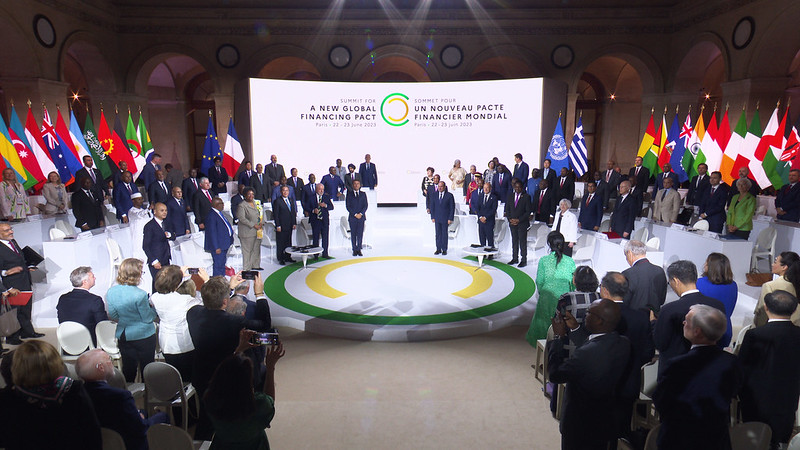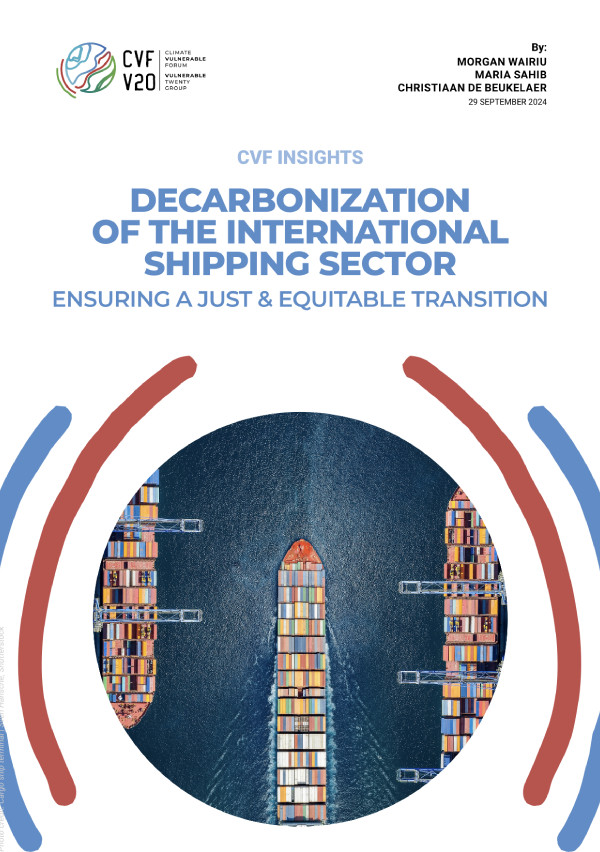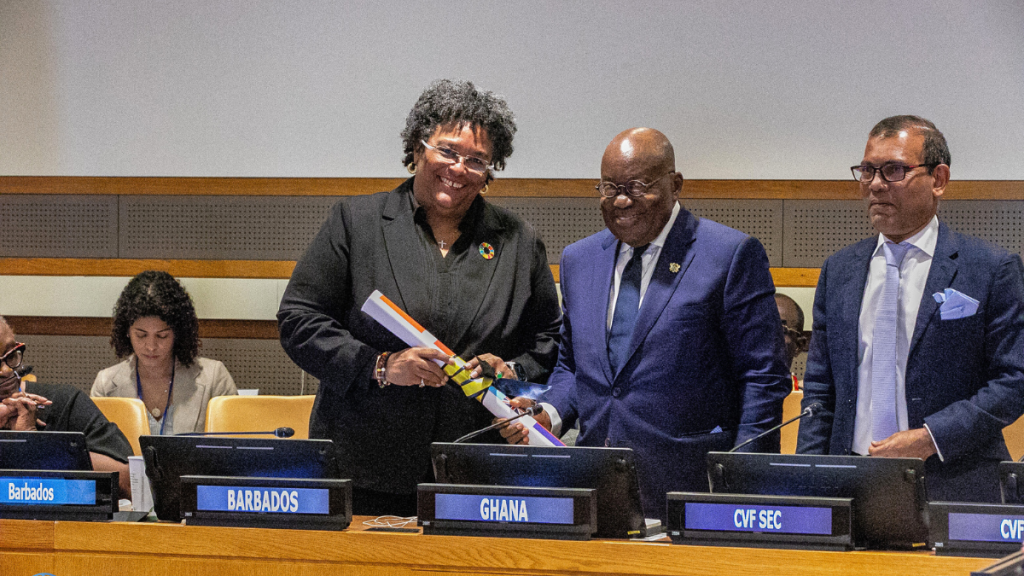Rebranding Old Pledges
Photo credit: Reuters
By Noor Saghir
A closer look at key issues and outcomes on Climate Finance within and outside the UNFCCC Process
The SB 58 Bonn negotiations and the Paris Summit for a New Global Financial Pact highlighted the vast hole in funding needed for climate action.
Two global climate-related events took place in June 2023, restoring the issue of climate finance to the table. The June Climate Conference which hosted the Sixth Technical Expert Dialogue (TED) under the Ad hoc Work Programme on the New Collective Quantified Goal on Climate Finance (NCQG1) on June 12 and 13, followed by the Paris Summit for a New Global Financial Pact, which took place in Paris on June 22 and 23.
Climate finance remains key to the implementation of the Paris Agreement. At the Bonn Climate Conference, discussions touched on the mobilization and provision of adequate and predictable financial support to developing countries for climate action, including setting a new collective quantified goal on climate finance in 2024. In Paris, 40 Heads of State and Government came together to discuss climate finance related to the transformation of the global financial architecture by proposing concrete solutions so that vulnerable countries will be better equipped to face climate change disasters.
The following article intends to provide an overview of key issues, outcomes, and takeaways on climate finance following these two major climate-related events.
Climate Finance highlights from SB58 UN Climate Talks in Bonn
The Sixth Technical Expert Dialogue was an important opportunity for parties to advance views on setting the quantum,” i.e., the quantitative elements of the new goal and on ways of framing the “mobilization and provision of financial sources” in the NCQG in relation to Article 9¹ of the Paris Agreement and Article 2, particularly its paragraph 1(c)². Participants were invited to discuss the key questions in dedicated working groups.
The NCQG is a definitive commitment to address the flow of climate finance from developed countries to developing countries within the UNFCCC and is expected to be operational by 2025. In setting the quantum for any post-2025 goal, several parties agreed that instead of setting one quantum, the future goal could be formed by sub-goals by looking at different thematic areas – adaptation, loss and damage, and mitigation goals. It should also be needs and science based and be guided by the principles Common but Differentiated Responsibilities and Respective Capabilities (CBDRRC).
Participants warned of setting a quantum which is politically determined (such as the insufficient $100 billion goal) by using a baseline number and doubling or tripling it as any baseline would be highly inadequate to respond to the evolving needs of developing countries. It is crucial to recognize that the $100 billion goal was not a negotiated goal but was conceptualized in an arbitrary process by developed country leaders and not rooted to specific financing needs of developing countries. The Least Developed Countries (LDCs) and the Small Island Developing States (SIDS) expressed concern that some parties continue to disregard developing country needs.
Many parties highlighted the importance of public finance particularly in the form of grants for adaptation and loss damage for vulnerable countries, while developed parties expressed that the new goal should expand its contributor base and be more transformational by considering concessional, non-concessional finance, innovative sources, private sector, and philanthropy.
For the 6th TED, Parties looked into the linkage between NCQG and Article 2.1.c. Delivering any new climate finance goal is intricately linked with the topic known by negotiators as ‘Article 2.1.c’ of the Paris Agreement. The increasing focus on Article 2.1.c was transparent in various deliberations and a point of concern for many developing parties. This demonstrates a clear attempt by developed countries to escape their climate finance obligations by re-evaluating NCQG as a vague goal around general global finance flows. Developing countries continued to stress in their interventions that the developed countries must deliver on their original commitment to the $100 billion goal in addition to responding to the provision of finance and the mobilization of finance. This is critical as many developed parties are also attempting to re-interpret Article 9 notably on the predictability and mobilization of finance by focusing on private sector investment and loans. Parties must be wary of tactics from certain countries wanting to shift the burden on the provision and mobilization on climate finance especially since ‘climate finance’ currently lacks a clear definition.
Accountability and transparency were also key elements raised by several developing countries concerning who would be responsible for delivering funding as Parties are the only actors that can be held accountable. Compelling non-state actors on who will be responsible for their expected contributions is challenging as such entities remain outside of the UNFCCC, making it difficult to track and monitor their commitments.
Although progress has been made on the NCQG, discussions must continue with ambition at COP28. The COP28 outcome should include a substantial decision on the NCQG capturing progress made during the TEDs and at the COP including the outputs from the Second High Level Ministerial Dialogue. There is a need for a roadmap on delivery to ensure accountability and transparency. Delays in delivering the updated NCQG figure in the post-2025 period will severely undermine climate action in developing countries.
Aside from the 6th TED on the NCQG, informal consultations on the Second review of the functions of the Standing Committee on Finance (SCF)³ were held between June 8 and June 14. Co-facilitators invited parties to share views on the agenda item SBI 17 on the functions of the SCF which centered on guidance to the Secretariat for the preparation of the technical paper on the review. Parties debated the proposed text as it did not reflect major concerns shared, primarily regarding the SCF’s general working modality and it fulfilling its core functions and mandated activities. Although developing countries noted the increasing workload of the SCF, they recalled an important function of the SCF which is the mobilization of climate finance and resources highlighting that it was established to provide guidance on financial mechanisms to developing countries. Following several rounds of amendments parties agreed on the draft conclusions of the Second review of the functions of the SCF.
Financing Pact “Fit for Purpose”
It is important to pay attention to other climate finance initiatives and discussions taking place in parallel and outside of the UNFCCC process, specifically related to the international financial system and reform. Around 40 leaders from the global north and south along with international institutions and civil society groups convened for The Summit for a New Global Financial Pact in Paris on 22 and 23 of June. The Summit aimed at finding financial solutions and planning reforms to mobilize more and better finance and address the debt crisis to support climate and development goals.
This was also a chance for developed countries to regain trust broken by unfulfilled pledges and inequity and scale up their share of finance and climate action. Developing country leaders were present to debate more responsive, fair, and effectives changes to multilateral finance institutions. They brought forward ideas to transform the financial architecture, such as increasing adaptation finance and raising new and innovative sources of finance for addressing loss and damage for the most vulnerable countries.
Barbados Prime Minister Mia Mottley, who co-hosted the summit alongside President Emmanuel Macron, set the tone ahead of COP27 announcing the Bridgetown Initiative, “a political agenda for the reform of the global financial architecture and development finance in the context of three intersecting global crises of debt, climate, and inflation”. In Paris, she expressed that the international financial order needs “absolute transformation and not reform”.
President William Ruto of Kenya called out the current financial system which is “broken”, “rigged” and “unfair” and stating that multinational financial architecture needs to be “fixed”. “We pay, especially those of us from the Global South and on the African continent, up to eight times more for the same resources, because of something called risk”.
Although the Paris summit has acknowledged the urgency in transforming the financial system, it has not unlocked any concrete breakthrough funding for climate action. Instead, rich nations and multilateral institutions, continued to propose funding commitments in the form of new and improved debt mechanisms – being loans or temporary debt relief rather than grants. This increase in climate lending by the International Monetary Fund and World Bank will continue to lead vulnerable countries deeper into debt for a climate crisis they did not cause. General claims of “good probability” of finalizing the long-overdue $100 billion in annual climate finance pledge to developing countries were also declared. However, as stated earlier, this commitment falls far short of poor nations’ actual needs, which are estimated in trillions, becoming once again a symbol of wealthy countries’ failure to deliver promised climate funds.
The Africa Climate Summit co-hosted by the Government of Kenya and the African Union Commission and co-convened by the African Development Bank and the Global Center on Adaptation between 4-6 September 2023 will be another opportunity to discuss climate action and ambition. Leaders from the Global South, and especially the African Continent are willing to commit to working together with industrialized nations to find practical solutions to develop faster and greener expectations.
References
- Article 9 focuses broadly on finance flows in general on the provision and mobilization of finance and says “developed country Parties shall provide financial resources to assist developing country Parties with respect to both mitigation and adaptation in continuation of their existing obligations under the Convention”.
- Article 2.1c refers to countries “making finance flows consistent with a pathway towards low greenhouse gas emissions and climate-resilient development”.
- The SCF plays a very important role in assisting the COP and the CMA in exercising its functions in relation to the Financial Mechanism of the Convention and the Paris Agreement.





